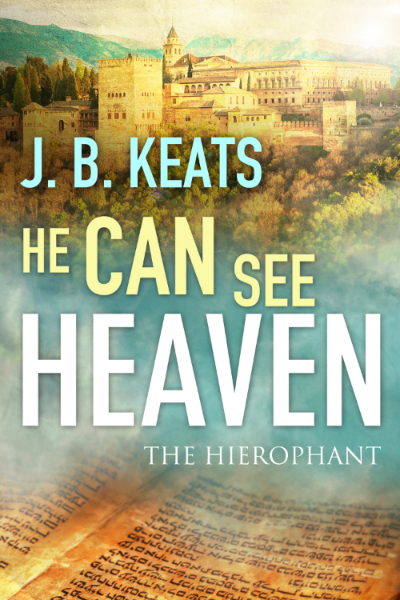
The definition of a “hierophant” is, according to my trusted internet sources, “a person, especially a priest in ancient Greece, who interprets sacred mysteries or esoteric principles.” That word, although perhaps unfamiliar to many, is particularly important to know when beginning the book He Can See Heaven by J.B. Keats. Before even starting the first page, I looked up that word since it is featured on the cover, directly underneath the title. Welcoming in brand new vocabulary was just the beginning of the vast array of knowledge I attained while reading this piece of literature. I am admittedly not a very religious person; I am almost certain I believe in a higher power, but that’s pretty much where my religious insight begins and ends. For that reason alone, I was curious about this book, seeing as, albeit I am fairly secular myself, I am extremely open to reading about anything that has to do with religion. I was raised, baptized, and received communion through a Catholic church, so I suppose I was especially intrigued by the thought of a book that delved deeper into the origins and foundation Christianity.
He Can See Heaven opens with an unmistakable air of mystery, quite reminiscent of The Da Vinci Code, which may or may not have been intentional, given the similar subject matter. That air hardly drops for the remainder of the novel (and believe you me, I was definitely not expecting the first chapter to end the way it did). The complete work is separated into “books” and within each book, there are chapters. The first book, “The Quelle” (The Quelle is the allegedly most original biography of Jesus, his life, and his teachings), as I mentioned before, begins with a bang and dives right into the story-line. Each chapter has a different character’s name and is told from his or her point of view.
At first, I had a slightly hard time keeping up– the action moves quickly with little explanation or initial exposition. I didn’t mind this at all, though; in fact, I sometimes prefer this to books that take their time at the beginning. Once I settled into the story, became acquainted with the names and the places, I had no trouble at all following along. Seeing that the first book spent the majority of the time elaborating on the character’s quest for ancient scrolls, I may have had a difficult time finding my footing solely because I am so unfamiliar with that type of content.
Keats writes eloquently; it’s obvious that he is a skilled writer, but he doesn’t use extra verbiage or extravagant language to ensure that this is known. He is the type of author that is able to make writing an entire book like this seem fairly easy, and that in itself is a feat. The novel doesn’t lose momentum after the thrilling first few chapters, either. If anything, it quickens the pace at some points, and there were times I found myself unable to put it down (problematic as I often read this while taking the subway to and from work.)
I felt a connection with Ellen, the protagonist, and I couldn’t help but love how empowered she was; how strong and self-sufficient. Also, as I noted before, I learned so much from reading this, including the fact that the hierophant, at least in this particular context, is a prophet who predicted the end of times, and can “see heaven”. I never realized how little I actually knew about the beginnings of Christianity and all of the mysteries that are intertwined throughout its history. I enjoyed very much that this novel addresses (in many ways, at least) a question a lot of us often ask: is the Bible telling the truth?
Much to my slight surprise (and enjoyment) Keats throws in a little bit of romance and definitely adds aspects of raw, genuine human emotion to his writing, creating a well-rounded story overall. The second “book” ( “The Saddlebags”) focuses a bit more on the origin of the different parts of the bible, as well as continuing on with the main plotline. All of the historical bits are quite clearly extremely well-researched, and at times I would almost forget I was reading a piece of fiction. The subject matter is one that seems to mean an awful lot to the author and this truly comes across on every single page.
I’m the type of person who is usually drawn to memoirs, or darkly-written comedies, so opening this book was a sure step out of my comfort zone. J.B. Keats neither bores the reader with historical facts, nor does he push any sort of particular belief on anyone. The novel is a nice blend of religious education, mystery, romance, and surprises (I don’t want to give anything away, but there are certainly a few twists I was not expecting). Maybe most importantly, it helped me to look at religion a little differently; perhaps even less cynically. Nothing is as it seems and there are always multiple sides to every story…even the bible itself.
Twisted Talk: Have you read He Can See Heaven? What did you think of the book? Discuss below!








